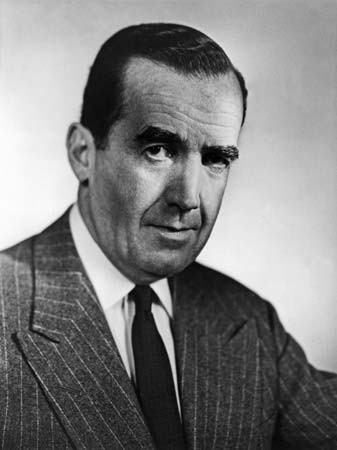Murrow was born into a poor family in North Carolina. He became interested in journalism at a young age, although it was not his livelihood just yet. In the first half of the 1930s he got a job at the Columbia Broadcasting System (CBS), where he became director of interviews and education. In 1937 he went to London with the task of building a network of correspondents in Europe, later known as the Murrow Boys. His first famous radio broadcast was an account of the German invasion of Austria. It was broadcast by correspondents from several European cities, with Murrow broadcasting directly from Vienna.
When World War II broke out, Murrow remained in Europe. He always began his speech with the words “This is London”, and his reporting brought him great fame in his homeland. When the United States joined the war, he expanded his group of war correspondents, and also took part in combat missions in Europe himself. At the end of the war, Edward R. Murrow was one of the first war correspondents to be allowed into Buchenwald concentration camp. He arrived at the camp on April 12, the day after its liberation. Three days later, Edward Murrow broadcast an extremely naturalistic account of what he saw:
This will not be pleasant to listen to. If you are at lunch or don’t feel like listening to what the Germans have done, now is a good time to turn off the radio (…) We crossed the main gate of the camp. A stinking horde appeared around me. Men and boys reached out their hands to touch me. They were in rags and remnants of uniforms. Death had already marked many of them, but they were smiling with their eyes (…) I entered one of the barracks (…) crowded people tried to toss me up, they didn’t have the strength to lift me, many of them didn’t have the strength to get up from their bunk. There were 1,200 people in such a barracks (…) I asked how many people in this building had died in the last month. They called a doctor, who brought notes. There was a list of people, and next to each name was a cross. I counted them (…) there were 242. When we went out into the courtyard, a man fell dead. Two others, they must have been over 60 years old, crawled towards the latrine. I saw it, but I won’t describe it.
Murrow’s radio broadcast was a tremendous experience for listeners. Later, Murrow faced great criticism pointing out that he had exposed Americans to such a harsh experience. Indeed, E.R. Murrow recounted:
In another part of the camp they showed me the children. Some were only six years old (…) An elderly man standing next to me said: “Children, enemies of the state.” Through the thin shirts I could see their ribs. (…) We headed into a small courtyard. The wall was about 2.5 meters high. It was adjacent to what used to be a stable (…) there were two rows of bodies stacked like firewood. They were thin and very white. Some of the bodies were terribly bruised (…) some had been shot in the head, but they bled little. All but two were naked.
He concluded by adding:
If I have offended you with this rather mild account of Buchenwald, I am not at all sorry.
